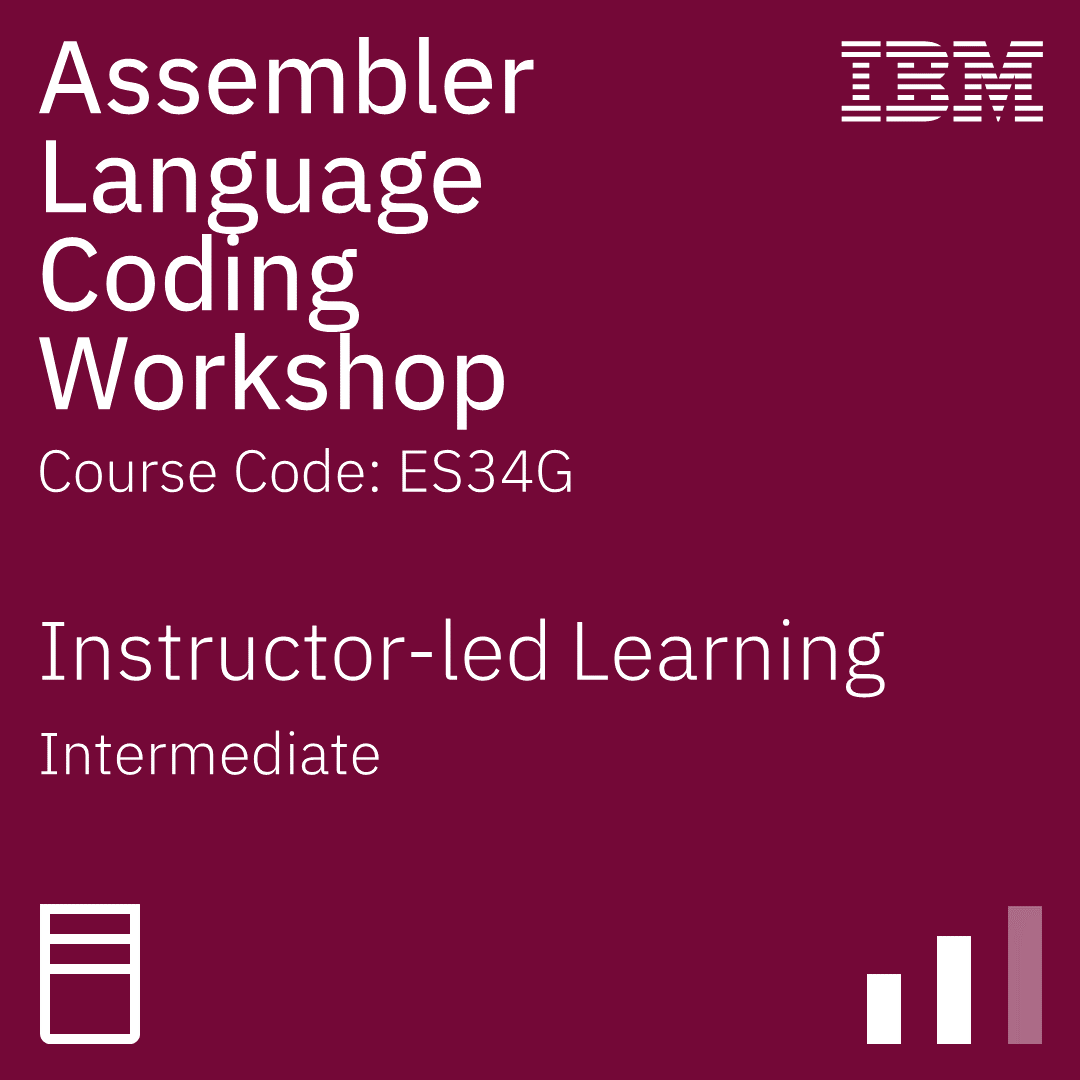title
Please take a moment to fill out this form. We will get back to you as soon as possible.
All fields marked with an asterisk (*) are mandatory.
Assembler Language Coding Workshop





Course Description
Overview
This classroom hands-on lab course provides an introduction to the mainframe Assembler language. The course is designed to develop the skills appropriate to write and/or maintain programs and routines written in S/370 or S/390 Assembler Language. Emphasis is placed on enhancing skills in problem resolution through program check interruption analysis and dump reading.
This course is one step in the following Learning Journey:
Objectives
- Recognize architectural features, such as instruction formats, data representation, storage addressing, and so on, which are significant to program analysis
- Identify point of program interruption, using the formatted system dump and elements of information such as the Program Status Word (PSW), the Instruction Length Code (ILC), the program's base register(s), and so on
- Identify appropriate standards for assembler programs in terms of program organization, register conventions, coding practices, documentation, and so on
- Code and debug assembler language programs which:
- Conform to standard linkage conventions using save area chaining
- Define and use various types of data definitions, including fixed point binary, character, hexadecimal, and packed decimal
- Employ standard macros such as CALL, SAVE, RETURN
- Use various Assembler Language statements such as CSECT, EQU, COPY, END
- Use both symbolic and explicit notational forms for instructions
- Use data literals appropriately, and explain the use of LTORG to direct positioning of the literal pool
- Create and use appropriate patterns for EDIT instructions
Audience
This intermediate course is for application programmers and/or beginning system programmers who code, maintain and/or debug application support programs or subroutines written in S/370 or S/390 Assembler Language.
Prerequisites
This classroom hands-on lab course provides an introduction to the mainframe Assembler language. The course is designed to develop the skills appropriate to write and/or maintain programs and routines written in S/370 or S/390 Assembler Language. Emphasis is placed on enhancing skills in problem resolution through program check interruption analysis and dump reading.
Topics
Day 1
- Welcome
- Unit 1 - Numbering systems
- Unit 2 - Mainframe architecture
- Unit 3 - Assembler syntax
- Overview of instructions: LA, LR, LTR, MVC, DS, DC
- Exercise 1 - 80/80 listing
- Exercise 1A - 80/80 listing
Day 2
- Exercise 1 review
- Unit 4 - Data definition statements
- Unit 5 - Fixed-point binary instructions
- Exercise 2 - Binary data
Day 3
- Exercise 2 review
- Unit 6 - Addressing, comparing, and branching
- Unit 7 - Data movement instructions
- Exercise 3 - Text handling
Day 4
- Exercise 3 review
- Unit 8 - Assembler pseudo instructions
- Unit 9 - Reading dumps
- Unit 10 - Packed decimal processing
- Exercise 4 - Packed data/editing
Day 5
- Exercise 4 review
- Unit 11 - Miscellaneous instructions
- Course wrap-up
Recognition
When you complete the Instructor-Led version of this course, you will be eligible to earn a Training Badge that can be displayed on your website, business cards, and social media channels to demonstrate your mastery of the skills you learned here.
Learn more about our Application Developers Badge Program →Related Courses
-
Advanced Assembler Language Coding Workshop
ES35G- Duration: 32 Hours
- Delivery Format: Classroom Training, Online Training
- Price: 3,580.00 USD
Self-Paced Training Info
Learn at your own pace with anytime, anywhere training
- Same in-demand topics as instructor-led public and private classes.
- Standalone learning or supplemental reinforcement.
- e-Learning content varies by course and technology.
- View the Self-Paced version of this outline and what is included in the SPVC course.
- Learn more about e-Learning
Course Added To Shopping Cart
bla
bla
bla
bla
bla
bla
Self-Paced Training Terms & Conditions
Exam Terms & Conditions
Sorry, there are no classes that meet your criteria.
Please contact us to schedule a class.

STOP! Before You Leave
Save 0% on this course!
Take advantage of our online-only offer & save 0% on any course !
Promo Code skip0 will be applied to your registration
Purchase Information
title
Please take a moment to fill out this form. We will get back to you as soon as possible.
All fields marked with an asterisk (*) are mandatory.










